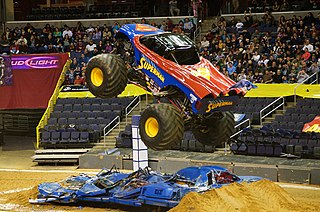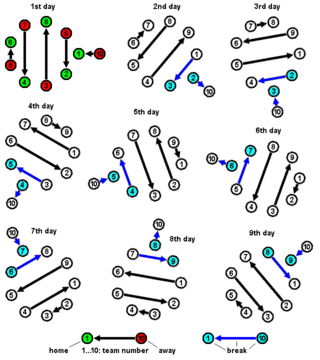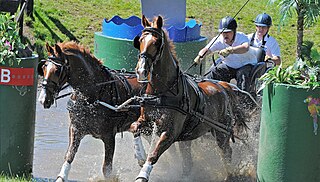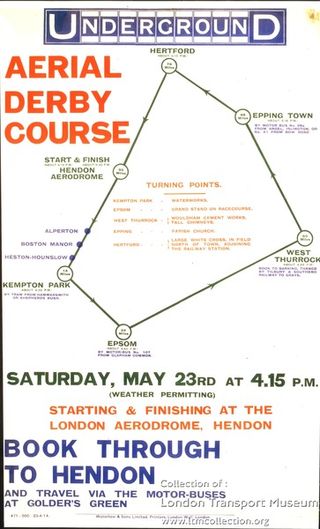
The biathlon is a winter sport that combines cross-country skiing and rifle shooting. It is treated as a race, with contestants skiing through a cross-country trail whose distance is divided into shooting rounds. The shooting rounds are not timed per se, but depending on the competition, missed shots result in extra distance or time being added to the contestant's total.

Drag racing is a type of motor racing in which automobiles or motorcycles compete, usually two at a time, to be first to cross a set finish line. The race follows a short, straight course from a standing start over a measured distance, most commonly 1⁄4 mi, with a shorter, 1,000 ft distance becoming increasingly popular, as it has become the standard for Top Fuel dragsters and Funny Cars, where some major bracket races and other sanctioning bodies have adopted it as the standard. The 1⁄8 mi is also popular in some circles. Electronic timing and speed sensing systems have been used to record race results since the 1960s.
A tournament is a competition involving at least three competitors, all participating in a sport or game. More specifically, the term may be used in either of two overlapping senses:
- One or more competitions held at a single venue and concentrated into a relatively short time interval.
- A competition involving a number of matches, each involving a subset of the competitors, with the overall tournament winner determined based on the combined results of these individual matches. These are common in those sports and games where each match must involve a small number of competitors: often precisely two, as in most team sports, racket sports and combat sports, many card games and board games, and many forms of competitive debating. Such tournaments allow large numbers to compete against each other in spite of the restriction on numbers in a single match.

Autocross is a form of motorsport in which competitors are timed to complete a short course using automobiles on a dirt or grass surface, excepting where sealed surfaces are used in United States. Rules vary according to the governing or sanctioning body, such as the length of the course, the amount of permitted attempts, or whether competitors start the course individually at intervals or at the same time as others. In this latter form, Autocross differs from other forms of motor racing by using a system of heats or alternative timing methods for the classification rather than racing for position and declaring the first across the finish line as the winner.

The Trans-Am Series presented by Pirelli is a sports car racing series held in North America. Founded in 1966, it is sanctioned by the Sports Car Club of America (SCCA). Primarily based in the United States, the series competes on a variety of track types including road courses and street circuits. Trans-Am is split into the TA and TA2 classes for silhouette racing cars, while its production classes are the GT, SGT, and XGT.

A monster truck is a specialized off-road vehicle with a heavy duty suspension, four-wheel steering, large-displacement V8 engines and oversized tires constructed for competition and entertainment uses. Originally created by modifying stock pickup trucks and sport utility vehicles (SUVs), they have evolved into purpose-built vehicles with tube-frame chassis and fiberglass bodies rather than metal. A competition monster truck is typically 12 feet (3.7 m) tall, and equipped with 66-inch (1.7 m) off-road tires.

A round-robin tournament or all-play-all tournament is a competition format in which each contestant meets every other participant, usually in turn. A round-robin contrasts with an elimination tournament, wherein participants are eliminated after a certain number of wins or losses.

Off-roading is the act of driving or riding in a vehicle on unpaved surfaces such as sand, dirt, gravel, riverbeds, mud, snow, rocks, or other natural terrain. Off-roading ranges from casual drives with regular vehicles to competitive events with customized vehicles and skilled drivers.

Demolition derby is a type of motorsport, usually presented at county fairs and national events. While rules vary from event to event, the typical demolition derby event consists of five or more drivers competing by deliberately ramming their vehicles into one another. The last driver whose vehicle is still operational is awarded the victory. Demolition derbies originated in the United States and quickly spread to other Western nations. For example, Australia's first demolition derby took place in January 1963. In the UK and parts of Europe, demolition derbies are often held at the end of a full day of banger racing.
Formula DRIFT is a United States-based motorsport drifting series. Formula DRIFT was co-founded by Jim Liaw and Ryan Sage in 2003 as a sister company to Slipstream Global Marketing, the same partnership that introduced D1 Grand Prix to the United States. The new entity would solely own, operate and launch the first official drifting series in North America. Formula DRIFT is not associated with the FIA series of formula racing championships.

A gravity racer or soapbox car is a motorless vehicle which is raced on a downhill road either against the clock or against another competitor. The vehicles are propelled by gravity.
The National Finals Rodeo (NFR) is the premier championship rodeo of the Professional Rodeo Cowboys Association (PRCA). It showcases the talents of the PRCA's top 15 money winners in the season for each event.

Combined driving is an equestrian sport involving carriage driving. In this discipline, the driver sits on a vehicle drawn by a single horse, a pair or a team of four. The sport has three phases: dressage, cross-country marathon and obstacle cone driving — patterned after the mounted equestrian sport of eventing. It is one of the ten international equestrian sport horse disciplines recognized by the Fédération Équestre Internationale (FEI). Combined driving became an FEI discipline in 1970 when Prince Philip, Duke of Edinburgh, the then-president of FEI, produced the first rule book.

Mud bogging is a form of off-road motorsport popular in the United States and Canada in which the goal is to drive a vehicle through a pit of mud or a track of a set length. Winners are determined by the distance traveled through the pit. However, if several vehicles are able to travel the entire length, the time taken to traverse the pit will determine the winner. Typically, vehicles competing in mud bogs are four-wheel drive. The motor sport is overseen by sanctioning bodies like the American Mud Racers Association, and the National Mud Racing Organization (NMRO), that oversee each class, develop and maintain the relationship with track owners to provide a racer and fan-friendly facility, ensure the sponsors get a good return, and help govern the sport.
A regularity rally, also called time-speed-distance or TSD rally, is a type of motorsport rally with the object of driving each segment of a course in a specified time at a specified average speed. The rally is usually conducted on public roads, but sometimes includes off-road and track sections. Contestants usually compete in teams composed of an amateur driver and navigator. Teams usually start a regularity rally at fixed intervals, creating a field that is spread along the course.
Food Network Challenge is a competitive cooking television series that aired on the Food Network. In each episode, professional chefs vie in a timed competition in their professional specialty. The winner receives a check for $10,000 and a gold medal. The first run of the series started in 2005 as a number of specials, before becoming a regular series that launched in 2007 and ended in 2011.

Cars Land is a themed area of Disney California Adventure, inspired by the Disney·Pixar franchise, Cars, and Route 66 in America. The 12-acre (4.9 ha) area, built as part of Disney California Adventure's $1.1 billion expansion project, opened on June 13, 2012, a year after the release of Cars 2. It contains three rides as well as shops and restaurants, all situated in a replica of Radiator Springs, the fictional town in which most of the first film's events take place. The area's main attraction is Radiator Springs Racers, a racing ride that uses the technology of Epcot's Test Track.

The Scripps National Spelling Bee, formerly the Scripps Howard National Spelling Bee and often referred to as the National Spelling Bee or simply “the Spelling Bee” in the United States, is an annual spelling bee held in the United States. The bee is run on a not-for-profit basis by The E. W. Scripps Company and is held at a hotel or convention center in the Washington, D.C. metropolitan area during the week following Memorial Day weekend. Since 2011, it has been held at the Gaylord National Resort & Convention Center hotel in National Harbor in Oxon Hill, Maryland, just outside Washington D.C. It was previously held at the Grand Hyatt Washington in Washington D.C. from 1996 to 2010.
The 2011 Global Champions Tour was the 6th staging of the Global Champions Tour (GCT), an international competition series on equestrian show jumping. The series was held mainly in Europe but three competitions were held outside of Europe. All competitions were endowed with at least €285,000 in prize money. All GCT events were held as CSI 5*.

The Aerial Derby was an air race in the United Kingdom sponsored by the Daily Mail in which the competitors flew a circuit around London. It was first held in 1912, with subsequent races in 1913 and 1914. Suspended during the First World War, the event was revived in 1919 with a "Victory Aerial Derby". Further races were held in 1920, 1921,1922 and 1923. Although a race was scheduled for 1924 there were insufficient entries, and the event was cancelled and not held again.















